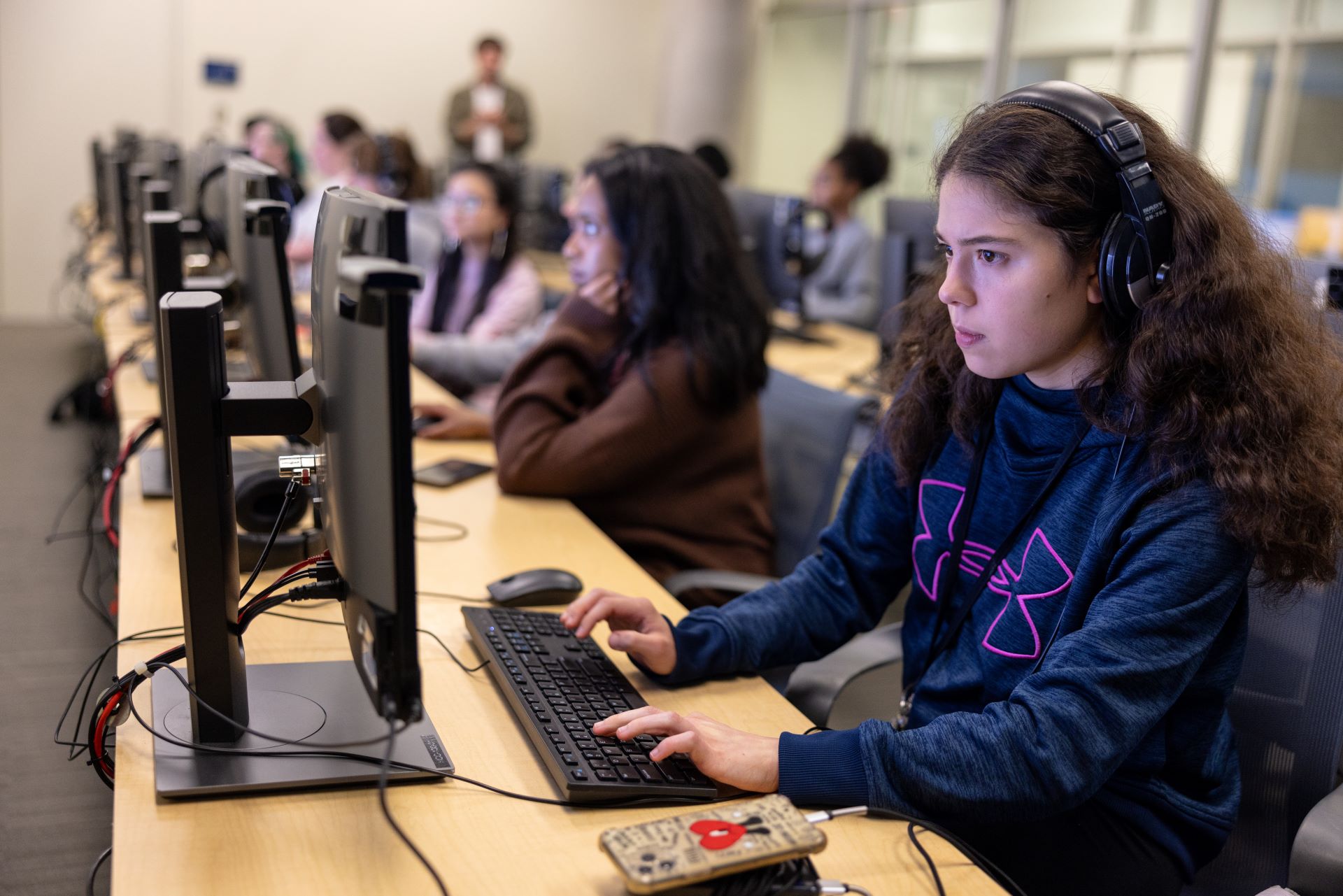UMW students can round out their liberal arts education by adding a Minor, and the Digital Studies Minor works well as a complement to a wide range of majors including English, Studio Art, Computer Science, and many more. Digital Studies students excel at getting the most out of the resources UMW offers to support digital work, including web publishing tools like our Domain of One’s Own web hosting service, production facilities in the Hurley Convergence Center, and the audiovisual equipment available for loan. Many Digital Studies Minors also go on to support other students’ digital endeavors by serving as consultants or leading workshops in UMW’s Digital Knowledge Center.
This minor’s capstone encourages independent research and creative work that has included projects as diverse as social media analyses, custom synthesizer mods, video essays, and graphic novels. Digital Studies Minors also contribute their content creation skills to UMW’s Lively video series and serve the community through various internships.
The Minor in Digital Studies is interdisciplinary by design, with a flexibility that helps students build the digital fluency and adaptability necessary in today’s rapidly-evolving digital landscape.
Alumni Testimonials
Required Courses
DGST: Intro to Digital Studies
This class is the foundation of the Minor and a requirement for the Major in Digital Studies. Because it also fulfills the Digital Intensive requirement of the General Education curriculum, DGST 101 is intended as a broad and beginner-friendly introduction to digital skills and digital culture. While specific topics and tools will vary by semester and instructor, all students will gain experience in creating content for the web while understanding the cultural and historical contexts for digital media.
The interdisciplinary electives in this minor allow students to explore many different areas of digital praxis and culture as a complement to their major. Students must complete at least four of the courses listed below from at least two separate disciplines, and at least two of those four must be 300-level classes or higher.
Digital Studies
- DGST 201: Tinkering, Hacking, & Making
- DGST 301: Special Topics in Digital Studies
- DGST 302: Creative Coding
- DGST 303: Digital Media Studio
- DGST 305: Intro to Video Production
- DGST 310: Virtual and Augmented Reality
- DGST 395: Applied Digital Studies
- DGST 491: Individual Study
- DGST 499: Internship
Communication
- COMM 353: Visual Rhetoric
- COMM 357: Social Media
- COMM 380: Sports & Digital Media
- COMM 460: Seminar in Digital Rhetoric
Journalism
- JOUR 300: Investigative Journalism
- JOUR 301: Magazine Journalism
American Studies
- AMST 204: American Foodways
Studio Art
- ARTS 104: Digital Approaches to Fine Art
- ARTS 219: Digital Video Production*
- ARTS 226: Animation*
- ARTS 241A: Photography I*
- ARTS 316: Experimental Documentary*
- ARTS 341: Multiple Imaging*
- ARTS 454: Approaches to Video Art*
Computer Science
- CPSC 106: Digital Storytelling
- CPSC 350: Applications of Databases*
- CPSC 440: Game Programming*
- CPSC 444: 3D Computer Graphics*
- CPSC 448: Advanced Web Application Development*
- CPSC 460: Human-Computer Interaction*
English
- ENGL 203: Writing with Digital Media
- ENGL 245: Introduction to Cinema Studies
- ENGL 253: Games and Culture
- ENGL 314: The Literary Journal: Professional Practice in Publishing and Editing*
- ENGL 317A: Writing & Literacy in the Digital Age
- ENGL 345: Film, Text, and Culture
- ENGL 350: Electronic Literature
- ENGL 386: The Graphic Novel
- ENGL 451: Seminar in New Media
Geography
- GISC 250: Introduction to Geographic Information Systems and Cartography
Historic Preservation
- HISP 303A: Archives and Society
History
- HIST 428: Digital HistoryMusic Technology
- HIST 325: Technology and Culture
- HIST 427: History of the Information Age
Music Technology
- MUTC 100: Technology for Musicians
- MUTC 170: MIDI Composition
- MUTC 320: Audio Recording
- MUTC 330: Audio Production*
- MUTC 370: Electroacoustic Techniques
Political Science
- PSCI 363: Mass Media Politics*
- PSCI 450: US Political Film*
Religion
- RELG 104: Podcasting Religious Studies
Theater
- THEA 481: Resource Strategies in Arts Administration*
* – these courses have prequisites.
The culmination of a student’s program in Digital Studies is a capstone course that builds on what they’ve learned in the electives. Students may complete any of the courses listed below, but many opt to complete a 400-level individual study. When registered as “DGST 491,” an individual study will automatically fulfill the capstone requirement, but a 400-level individual study in any discipline may be acceptable if approved in advance by the director of the minor. In some situations — if no other options are available, for example — some other 400-level course can be approved as a capstone.
- ARTS 454: Approaches to Video Art
- COMM 460: Seminar in Digital Rhetoric
- DGST 460: Digital Studies Seminar
- ENGL 451: Seminar in New Media
- HIST 427: History of the Information Age
- HIST 428: Digital History

